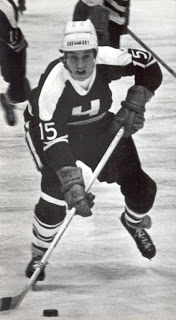The Assist

H floats down the ice, juggling the black biscuit, weaving in and out of defensemen. He shoulders his way around the last hulk for a showdown with the goalie. The goalie’s face is hidden by a white mask that makes him seem eerie and ominous, and his giant pads give him a leviathan look. H knows how to get the puck past him—draw him to the right and surprise him. When the goalie lowers his glove to the ice, H can lift the puck—go upstairs, they say—and shoot it over his shoulder. He did it many times when he played high school and college hockey. Deeking the goaling, fooling him. It’s a sweet feeling to score, to raise the stick in victory, to be the hero.
He’s been there. And he’s over it.
In his peripheral vision he sees one of his teammates on his left. He’s gotten through the defense, too, and slaps his stick on the ice. H looks through the white mask into the goalie’s eyes. He’s hunkered down, waiting for H to strike. H sets his mouth and pulls back his stick, keeping his eyes glued to the goalie’s, mesmerizing him like a snake charmer. But instead of slapping the puck toward the goalie, he slows down the stick and passes to his left. The biscuit hits his teammate’s blade square on and he stuffs the hole the goalie has left in the net.
Now it’s H’s teammate who raises his stick and does the hero’s dance. Then he gives H a gentle punch on the arm, a quick thanks. H grins. The thanks feels better than if he’d scored the goal himself.
In hockey a player earns one point for a goal or one point for an assist. At the end of the season, the Art Ross Trophy is awarded to the NHL player who leads the league in scoring points. For hockey players, points are like medals, and some players decorate their helmets with stars for each point won. But it’s the scorer’s name that the announcer yells out and the scorer’s name that’s put up on the scoreboard and the scorer’s name that the crowd cheers so loudly that when the name of the guy who gave the assist is mentioned, no one hears it.
“Did you score tonight?” I ask when H comes home after the game.
“No,” he says. “Not tonight.”
“Get an assist then?”
He nods. “Some guys need the ego boost.”
H gets his ego boost from helping the other guy, and that’s a lesson I’m trying hard to learn. As a writer, recognition is important to me, getting published, being respected for my stories and essays. But things are changing as I get older. In Aboriginal societies, one is designated an Elder after acquiring significant wisdom and experience. I suppose in my accumulated experience, I might be considered an Elder, even though I’m far from wise. What experience has taught me is that I don’t need to be the star, to stand on stage and command attention. It’s odd how this shift in perspective has reinforced my own faltering ego. When I give praise to a young writer for a solid sentence or a lilting phrase and her writing starts to shine, I feel good. And when I help teachers hone their lessons, I’m thrilled.
After living with H for two decades, I’ve started to appreciate what it means to give the assist. That’s not to say I’ve given up trying to score on my own. I still send out my stories, still puff up when a manuscript is accepted for publication. But I’m just as happy when I see my name in the acknowledgments of a book written by someone I’ve helped along the way. There’s no doubt that life is a team sport. All of us need to rely on each other to feel like winners—whether we score or not.



Comments